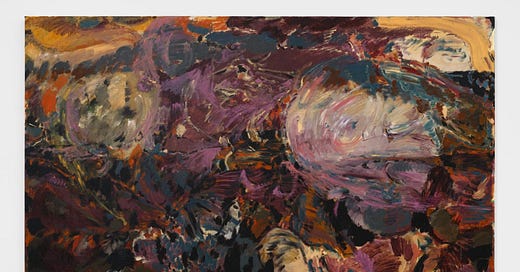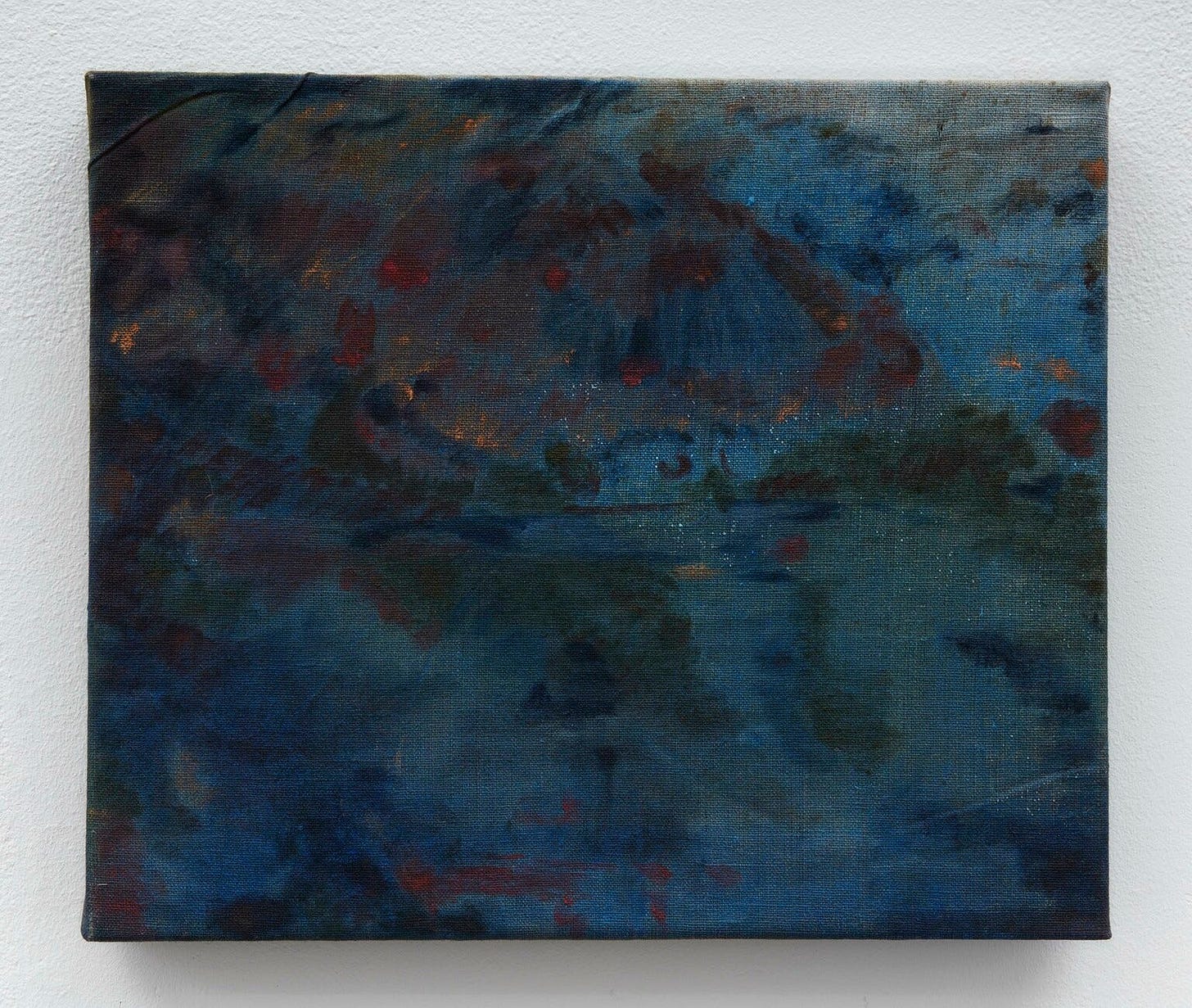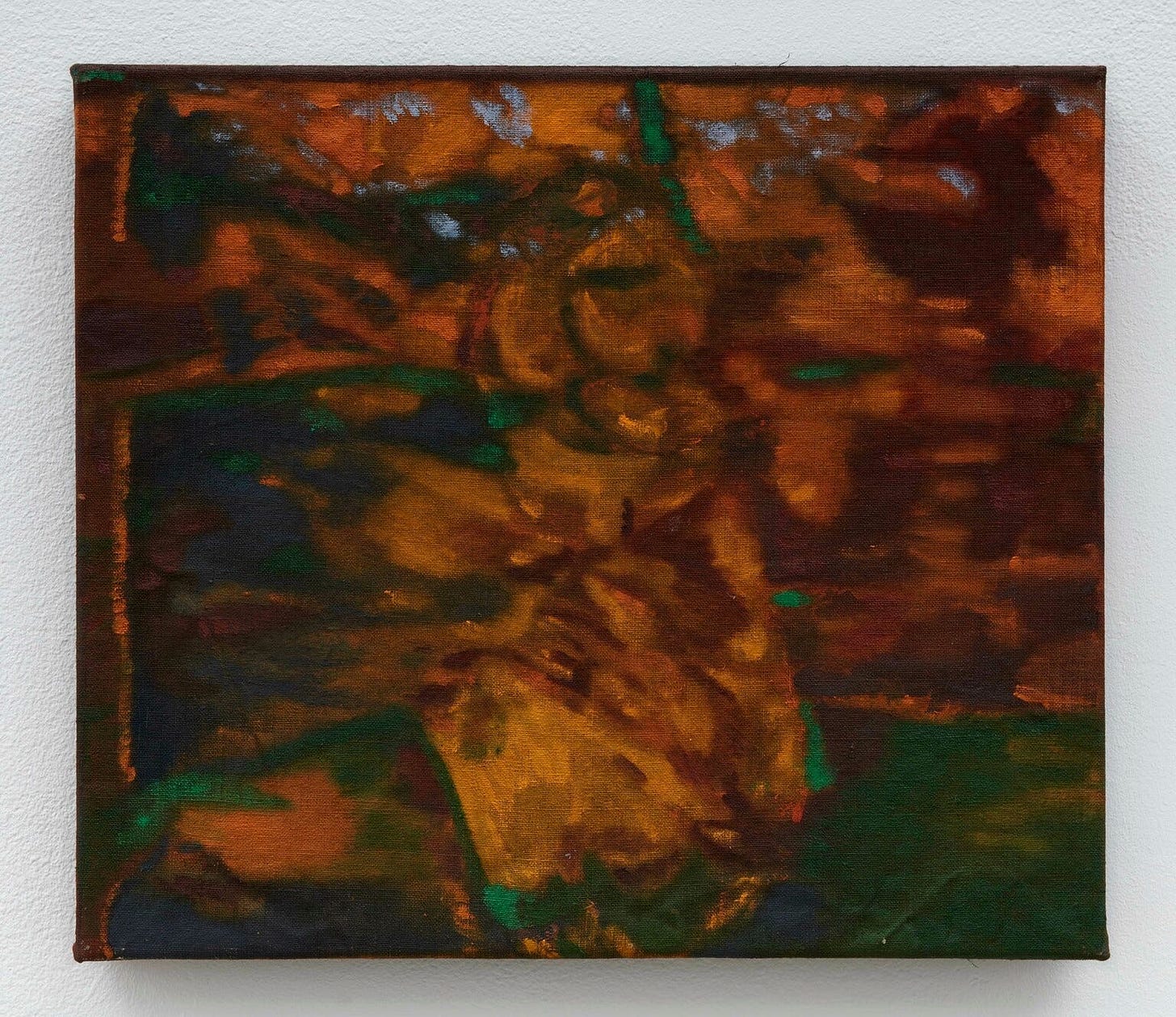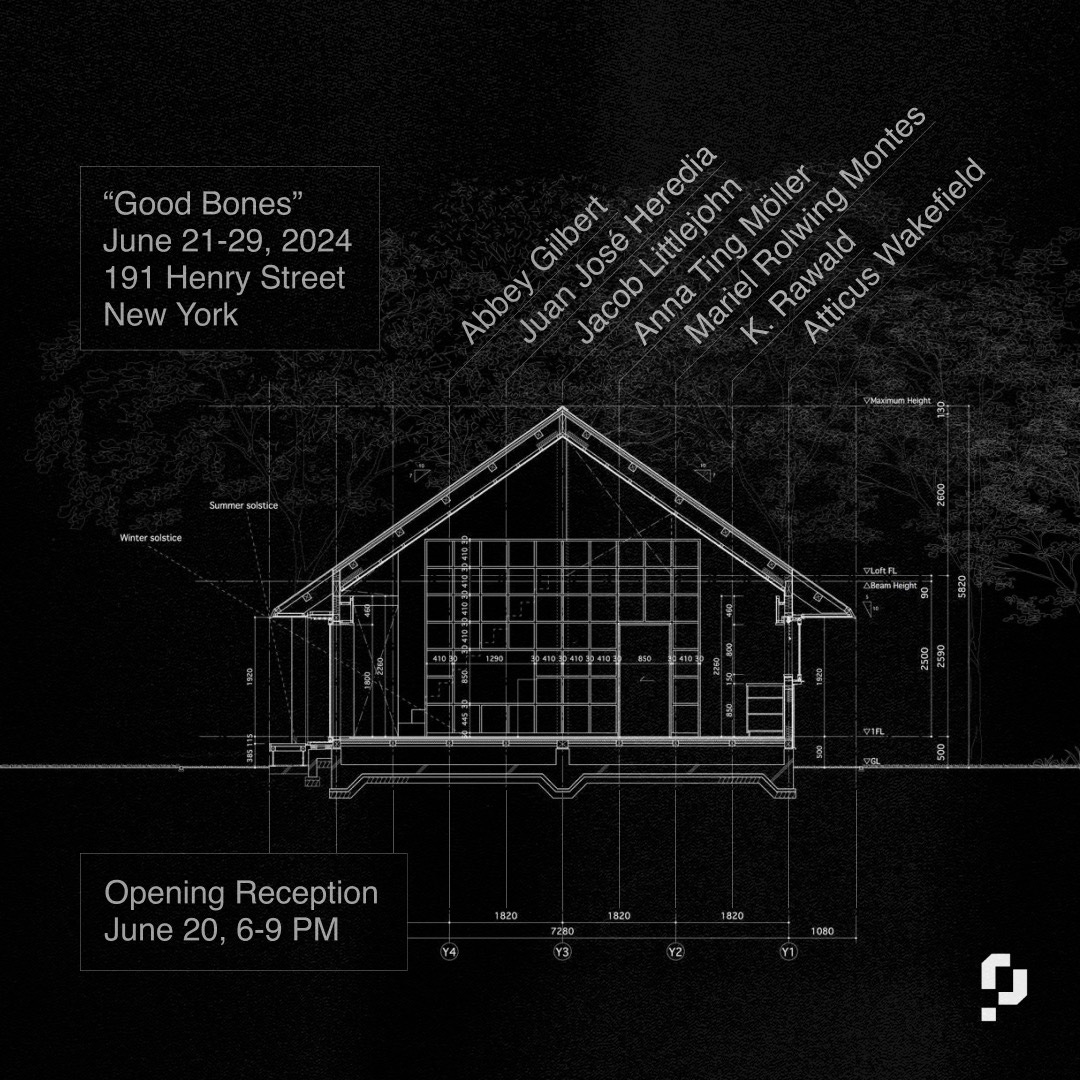#59: there is no distance
live piano concert in Central Park, Elizabeth Gilbert, and Xandra's gallery!!!!!!!!
One quick note before we jump in: my dear friend and the incredible art curator of Char’s Web, Xandra, has her very own show on the LES open from Weds-Sat (6/26-6/29) this week. Cannot recommend visiting enough. She is an absolute wizard and the way that she explains her connection to art makes an industry that can sometimes feel nebulous and intimidating into something deeply personal and intimate. Go!!! Details in “Xandra’s Curation Corner” at the end of this newsletter.
Above is an audio recording of me reading this post for those who prefer listening. Thank you for being here! And thank you, Philipp Kaspar, for the intro music.
there is no distance
Sitting atop a small mound in Central Park, an empty piano is set up. It’s early in the evening. The sun is low and suggestive of a spectacular sunset to come.
People gather around, some alone, some in pairs, some with young kids sprawling off the edges of their picnic blankets and the older ones running loudly across the field. Baguettes and bottles of wine poke out of bags, and in rare New York form, every single one of these strangers seems to be enjoying themselves and each other at the same time.
A man in a casual white shirt and linen pants walks over to the piano and those who notice place their headphones over their ears. The rest follow in one fell swoop of social contagion. His voice is soft and masculine. There’s a whisper to his sound that evokes intimacy, booming through each set of headphones as though you are all there alone, together.
He thanks you for being present and tells you of a time when he was a concert pianist, playing on stages across New York. Something ached in him to play by the water and in open fields and he wondered how he could bring an audience with him. So began Mind Travel, an experience unlike anything I’ve ever been to.
He, Murray Hidary, begins playing. Each note is crisp, clear, and imbued with meaning. His continuous solo performance lasts for the better part of two hours. I’ve been once before, around this time last year, and on this second go, it took me a moment to settle in. To get comfortable. To allow myself to just hear the music without needing to force an experience.
One of the coolest parts of listening to this performance through a set of Bluetooth headphones is that you can roam throughout Central Park during the live concert.
Restless on the ground, I got up and walked across the field. I was drawn to a particular spot in the distance, marked by trees and slivers of an emerging auburn sunset. As I got closer, I found one strip of light breaking through the path of a long street before me, lines of buildings on either side that edged right up against the perimeter of the park. I stood looking out from the trees at the sunset above the city and listened to Murray talk about grace.
Grace is allowing yourself to feel. Anger, rage, fear, pain, hurt. Letting it in until you finally give up. Only after giving up, is there a giving in. A forgiveness, a reunion, an understanding.
A reunion only takes place when mutual grace is given, felt, and received. You cannot hold grace and grievance in the same hand, Murray said.
There is no distance.
There is no distance. He kept on saying it.
No distance, no distance, no distance. Between us, within us, to some other source of intelligence.
Chills washed over. I felt heavy on this day for a lot of reasons, which made it hard to assign meaning to any particular one. Nothing was wrong, per say, but I felt weighted and agitated and it was making it hard to fully settle in. With each encouragement from Murray, I felt myself quietly let go. The more I let go, the more his message resonated.
letting go
of hurt
of need
of trying
of effort
of desperation
of fear
of not being enough
of not having enough.1
There’s something about knowing that Murray is playing live there with you while you’re walking and occupying your own quadrant of the park that changes your experience of hearing. It transcends any normal experience of a concert. His words don’t feel as though they come from an individual who possesses all responsibility for his own genius. They feel as though they come from elsewhere. In the same way that public parks invite you in and don’t feel “owned” by anyone, Murray’s voice and wisdom feel like communal goods, sweeping through him and directly into you.
It was almost as though Murray’s voice booming through my headsets was an embodiment of grace itself. It held the same tension of existing within me and outside of me simultaneously.
This reminded me of Elizabeth Gilbert’s TedTalk about, “Your elusive creative genius.” Gilbert talks about the mystery of creativity and how paranormal it can feel.2 In ancient Greece and Rome, she explains, creativity was thought to emerge not from the individual but from gods or entities beyond ourselves. He or she was not a genius; he or she had a genius. This genius was like a little fairy or garden gnome that hovered in corners of a room and swooshed moments of pure genius the artist’s way at god-forsakenly random times. And then the Enlightenment came, and we changed our entire conceptions of genius. We started calling humans themselves geniuses which equated the production of genius works with the effort of the individual.
This shift left us alone in our creative endeavors. Ironically, the ancient practice of labeling “genius” as something outside of ourselves had actually kept it closer and made it more accessible. Once brought inwards during the Enlightenment, we each felt responsible for squeezing our genius into the world through force rather than recognizing its ubiquitous existence in every moment.
Elizabeth Gilbert tells the story of how the poet Ruth Stone would feel poems coming at her like a "thunderous train of air" and had to race to capture them before they moved on to another poet. She shares how musician Tom Waits changed his approach to inspiration by externalizing it. When a melody came to him while driving, he told the inspiration to come back at a more convenient time when he had a pen and paper in hand.
Gilbert describes her own method of dealing with creative blocks by having conversations with her "genius." During a difficult period writing "Eat, Pray, Love," she spoke to an empty corner of her room, asking her genius to show up and help, thus sharing the responsibility of the creative process.
I saw a parallel between Gilbert’s suggestion of seeing our genius as sitting outside ourselves with Murray’s depiction of grace.
grace doesn’t try, it simply melts and melds with you, into whatever you are going through.
walking in the rain, the droplets rolling down the contours of my face, my body with ease.
to break free of the heavy gravity of righteousness. rising and rising through compassion and surrender, the fuel for grace’s escape velocity.3
We lose sight of our own connection to grace and creativity when we try to force our way through, rather than recognizing a presence beyond us. There is only so much that we can do on our own accord. The rest is not ours to carry. And it is actually necessary to forget this truth sometimes in order for messiness to arise and pave the way to remembrance.
maybe grace sometimes needs the messy to arise, to be felt.4
In the anger, rage, contrast, frustration, fear, grief, confusion, and the rest, we eventually reach a point. A point of surrender. Of letting go. Of giving up. And only after the giving up is there a giving in. A pathway. The emergence of an idea. A new kernel of truth.
In standing in that beacon of light and listening to Murray’s conception of grace, I was reacquainted with my own sense of it. The heaviness I was holding made its way through and the next night, I sat in my bed with the 7 or so journals that I’ve filled in the past 2 years and sprawled them across my comforter. I find that the best way to discover answers to the big questions are to bury their clues and go digging for them in the future. That’s why I kind of love the messiness of a meandering journal. Something about writing something down and forgetting about it only to discover the words of a past version of yourself months or years later feels like a better, more refined compass than almost anything else.
There is no clearer visualization of creativity and grace than looking back on your life over the past few years and feeling awestruck by how it panned out. Especially when you zoom in on the details. The chance encounters that led to new relationships. The ideas that took on lives of their own. The grief that you couldn’t have fathomed. The unthinkable amount of joy and gratitude that permeates it all. In hindsight, it is so clear that so much of this is out of our control. Grace and creativity are within us at all times but when you look back, they appear as immutable forces of their own.
If we are able to play with the externalization of grace and creativity in real-time, it ironically brings them closer. In labeling their existence as other, we are able to relate to their potency with more ease. We feel less alone, less responsible, and less transfixed on control.
I find the command, “give yourself grace", to be unattainable. It feels to me like telling someone to “relax.” Like okay. I would if I could but the problem here is that I actually do not have access to that right now. It is not that you need to give yourself grace through willpower or discipline. You simply need to allow it to wash over you, which follows the recognition and surrender to the fact that it comes from somewhere else.
Going to Murray’s performance, letting grace pour over me, standing in that beacon of light and allowing myself to ring out my sponge, then paved the way to clearly identifying my own needs, having the energy and courage to meet them, and finding the pathway toward awe again.
There is no distance. I can’t stop hearing that.
There really is an infinite surface area to feel touched by something beyond ourselves. And once you are reminded of it, a feeling of novelty and independence comes back, both of which are the precursors to a deeper feeling of connection.
grace is present before we recognize it.
grace accepts even when we don’t.
grace forgives even when we don’t forgive ourselves.
especially when we don’t forgive ourselves.
grace heals.5
Grace is a precursor to awe. Awe slows down time. Awe reminds you of what matters.
If I could know the absolute truth to one question, my question would be “What is the purpose of this all?”
Yet, at the same time, I think the whole point is that we don’t know the purpose. I think the purpose is to continue looking for it. And to look for it, messily, unorthodoxly, and in our own ways.
I think of it like this. Every single day, in every single moment, whether aware of it or not, we are laying down a trail of breadcrumbs that help us make sense of our purpose from a rear-eyed view. But it’s not actually the looking back that matters, it’s the laying of the crumbs themselves. Maybe there is no sense to make of it at all.
In the words of Mary Oliver, “If you suddenly and unexpectedly feel joy, don’t hesitate. Give in to it. There are plenty of lives and whole towns destroyed or about to be. We are not wise, and not very often kind. And much can never be redeemed. Still life has some possibility left. Perhaps this is its way of fighting back, that sometimes something happened better than all the riches or power in the world. It could be anything, but very likely you notice it in the instant when love begins. Anyway, that’s often the case. Anyway, whatever it is, don’t be afraid of its plenty. Joy is not made to be a crumb.”6
If you could know the absolute Truth to any question, what would it be? What was your last real experience of awe?
That’s all for today!
Thanks for Getting Caught Up in Char’s Web.
With so much love,
Charlotte
Xandra’s Curation Corner
Xandra Beverlin is an incredible art curator at Pace Gallery, co-founder of PULSE, and dear friend, who so generously pulls pieces for this newsletter each week. I text her a few short bullets about the main themes of Char’s Web and she replies with the most thoughtful articulations of the artists that come to mind. This is my favorite part of writing my newsletter. Do yourself the favor of reading her curator’s notes!
“Hello! Ok re curation — I love the concept of genius flowing through us / creativity existing outside ourselves. I’ve been reflecting a bit on how that would manifest for me: ultimately I keep coming back to the intense unknowability of the natural world. Growing up in cities, I’ve never really been that comfortable in nature — which I think actually makes it the perfect grounds for inspiration. After all, creativity and discomfort so often intertwine. A new idea, concept, or methodology inherently pushes us outside the bounds of our tightly-clutched routines, our siloed visions of perceiving the world. Nature so often is conducive for this process, epitomizing what it means to be alive.
An artist who I think communicates this brilliantly is Jacob Littlejohn. His work aims to illustrate the sublime, capturing the rapturous elements of nature that both scare and surprise. In a way, I do think the ‘genius’ you’re referring to is present is in his work - you can see it in the strikes of light and color that seep across the canvas in nearly godlike mannerisms. As he mentioned to me at a recent studio visit, nature is a force speaking to us from memory - it’s like the sensation seeing something even with your eyes closed. What is this, if not some iteration of ‘genius’?”
- Xandra Beverlin, June 2024
Char’s Web Song of the Week
All past issues of Char’s Web are available for reading here. A few samples below…
#1: A first of many.
#44: tits up!
#49: we have to be orderly on the instant
#56: do it for yourself
#58: permission to reinvent yourself
Elizabeth Gilbert, Your elusive creative genius, TedTalk, 2009.
Ibid.
Ibid.
Mary Oliver, “Don’t Hesitate,” Swan: Poems and Prose Poems (Boston: Beacon Press, 2010), 28.








so happy you are back! loved this! and please tell me when next one is as i really want to come xx